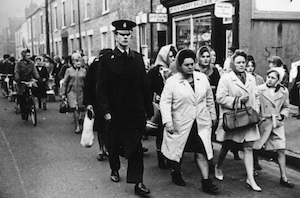A lot of my blogs have been related to girls from my current city of Hull, UK. Since realizing this, I couldn’t go without writing about Lillian Bilocca, one of Hull’s most famous daughters.
In the 1960s, thousands of men from Hull were involved in deep-sea trawling. This involved going to sea for weeks at a time, and casting nets in the cold seas around Iceland, Russia and the Arctic Circle in the hopes of catching a good haul of cod. The work was arduous and dangerous.
In a period of three weeks over January and February 1968, three trawlers from Hull were lost at sea, overcome by the weather, seas and ice on deck. 58 men perished; just one survived.
The loss of the three ships was a massive blow to the tight-knit fishing community. Meetings were held to bring attention to the conditions the fishermen worked in, with the wives, sisters and mothers of many fishermen taking the lead. Among these women was Lillian Bilocca (1929-1988), known as Big Lil, an inspiring and outspoken woman who mobilized and motivated the community.
The women, who have since been nicknamed the ‘Headscarf Revolutionaries’, began by picketing the dock, arguing that all ships should carry radio operators so that they could communicate danger to other ships. Next they travelled to London, drawing much media coverage, where they spoke to Members of Parliament and Prime Minister Harold Wilson, about reforms in the fishing industry.
The low job security of trawler crews had meant strike action was hard to organize, but now men rallied behind Big Lil. The women’s high profile came at a price, however; Lillian Bilocca received threatening phone calls and lost her job at the fish processing plant where she worked, all for getting involved in what was seen as a ‘man’s world’.
Over just a few weeks, Lillian Bilocca and the Headscarf Revolutionaries were able to mobilize the fishing industry to implement reforms and safety measures that had been campaigned about quietly for years, and would vastly improve fishermen’s safety at sea. Four independent inquiries into the sinking of the three ships and general trawler safety took place, and the safety-measures that resulted undoubtedly saved many lives.
-Jocelyn Anderson-Wood
Junior Girl
Girl Museum Inc.
Picture from Barbican Press

